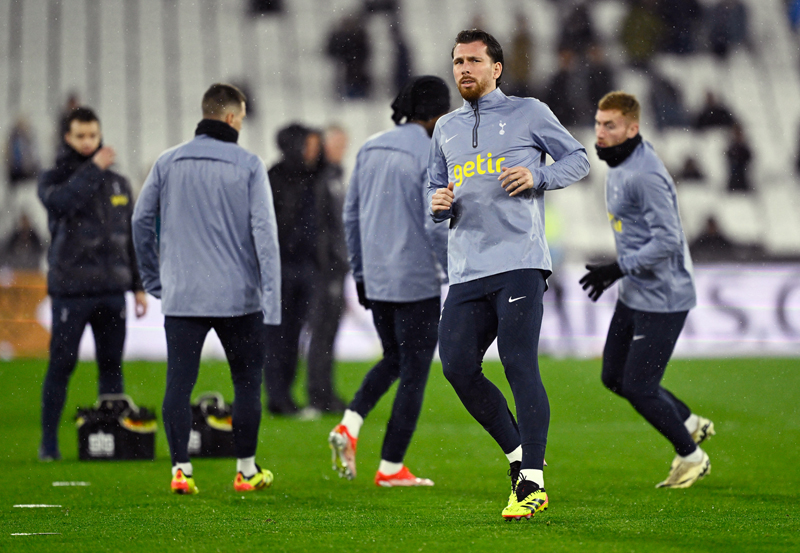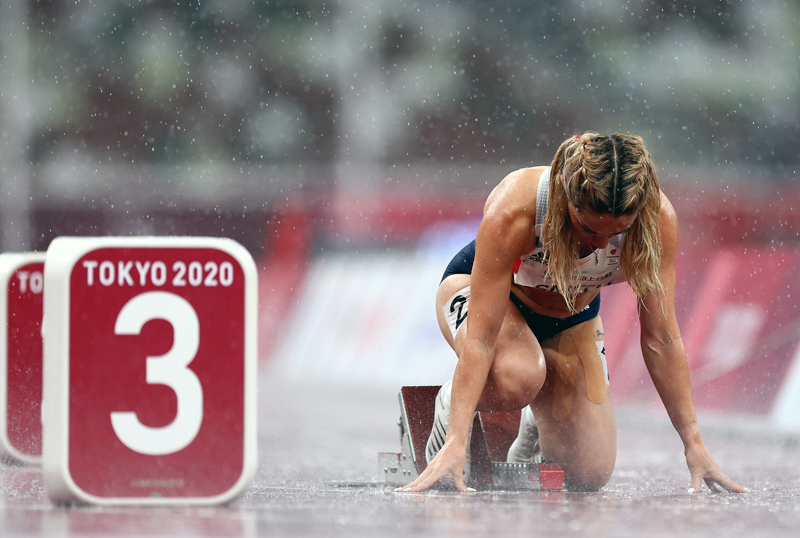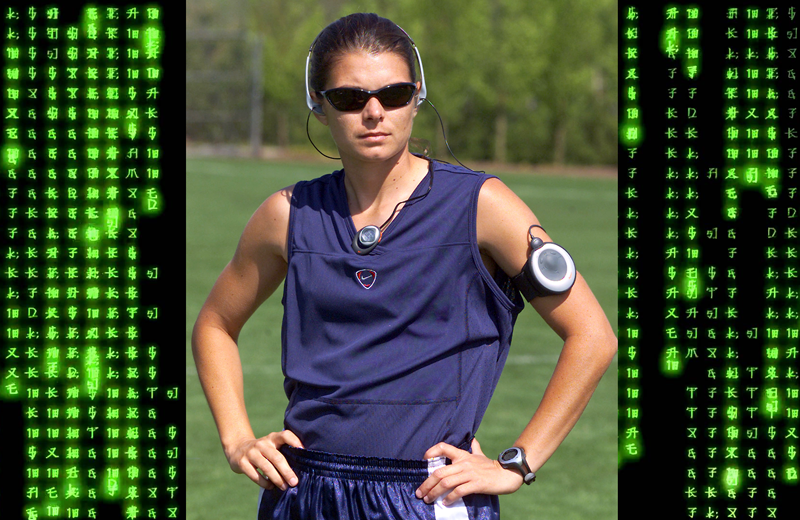Mind over movement: using meditation for performance
Meditation is the new tool in the kitbag of sports psychology, but can a mantra really improve sports performance? Alicia Filley explores how inner bliss could help propel you across the finish line in record time!
The goal of every athlete is to perform at their best, at just the right moment in time. This optimal performance is called functional athletic behaviour (FAB) and requires not only physical skills, but acute mental focusBMC Psych. 2016;4:39. Negative thoughts, distraction, lethargy, along with physical ailments, can impact FAB. Therefore, sports psychologists have long recommended using mental strategies to gain an edge in competition. Historically, athletes used such skills as visualisation or imagery, self talk, goal setting, suppression, distraction and arousal regulation. These skills come from a school of thought known as ‘psychological skills training’ (PST). Psychological skills training promotes awareness of thoughts, feelings, and sensations, in order to gain control over them. Mindfulness (meditation) fosters a similar awareness – however, what happens next differs significantly.
What is mindfulness?
The use of mindfulness in sport began in 1985 with a trial of meditation by collegiate and Olympic rowersJ Clin Sports Psych. 2014;8:221-44. Some of the rowers felt their competitive performance had improved during the trial, and attributed it to the meditation training. Research conducted since proves mindfulness lowers stress, decreases anxiety, and produces lasting physical changes in the brainJ Clin Sports Psych. 2014;8:221-44. Mindfulness can be defined as a fully present attention to everything experienced in the moment (physically, emotionally, spiritually, mentally, and perceptually); however, the focus is to accept each aspect of the experience with compassion. In a mindful state, the sensations, thoughts and emotions you experience simply exist, without any other judgement or action. This level of acceptance allows the athlete to focus on what is needed in that moment, rather than the circumstances of the task, which results in enhanced mental efficiencyJ Clin Sports Psych. 2014;8:221-44. Many approaches to mindfulness training exist but they are often divided into two schools of thought (see figure 1). The first is ‘focused attention meditation’ (FAM), in which the participant focuses on a specific object or action, like breathing. When a sport requires laser focus on a sequential and predictable task, such as hitting a golf ball, FAM may enhance that focus and enable the athlete to eliminate distractions.
FIGURE 1: DIFFERENT TYPES OF MEDITATION

The second type of meditation is open monitoring meditation (OMM) where the subject monitors all external and internal input but remains open and nonreactive. This type of meditation likely weakens task/goal focus. However, in sports such as football where the circumstances are constantly changing, OMM may help the athlete process multiple types of input and choose a correct response.
Enhancing performance
Inner peace is all well and good, but will it actually help you obtain a PR? Researchers at the French Institute of Sport, Paris, looked to answer that question with a population of competitive golfersJ Clin Sports Psych. 2009;4:320. Seven young, elite golfers, previously instructed in PST, participated in a 4-month course of mindfulness training. In between the structured sessions, the golfers were to practice pre-recorded guided meditation exercises independently, two times per week.
The researchers then trained the golfers in an applied exercise routine to encourage assimilation of the learned mindfulness skills with their performance routines. They instructed them to scan both body and environment and notice the circumstances they found themselves in, yet trained them to focus on the target, the trajectory, and choosing the required club. The last stage of the exercise encouraged the golfer to focus only on the target, not on the stroke, helping the stroke to become more automatic.
At the end of the season, the researchers compared the mindful golfers to a control group from another training centre who underwent the same initial PST training. The golfers who received the mindfulness training all increased in national ranking, while only two of the six golfers in the control group did. All of the mindful golfers reported improvement in their performance since becoming more mindful. To determine if meditation improves performance in a sport that requires a broader awareness, a study at the University of Tehran examined how mindfulness training effected the performance and anxiety levels of young football playersZadkhosh, Seyed. J Sports Psych Studies. Sports Research Institute of Iran. Accepted for publication. Fifteen players received 30-minute guided meditation training twice a week for six weeks. The 15 players in the control group didn’t receive any intervention. Sports Anxiety Scale Questionnaires and Shooting Performance Tests were administered to both groups before and after the mindfulness training. The anxiety scale scores decreased and the performance scores increased in the intervention group, significantly more than in the control group. The dosage of mindfulness training and protocols differed profoundly between the golfers and the football players. However, both showed improvements in performance. This led psychologists to question just how meditation works to improve performance.
Overcoming obstacles
Psychologists from Europe and the United States conducted a multicentre, multifaceted study to determine how mindfulness improves football performanceAnxiety, Stress, and Coping. 2014;27(3):270-287. This study evaluated the role mindfulness plays in self-efficacy, and sports performance. The researchers found that the direct correlation between mindfulness and goal-shooting performance was negligible. However, mindfulness training DID improve scores relating to the coach, peer leadership, and the team in general, which in turn predicted better shooting performance. In short, the more mindful players believed they had greater power over other perceived barriers, which then predicted better shooting performance further down the line (see figure 2).
FIGURE 2: THE RELATIONSHIP BETWEEN MINDFULNESS, SELF-EFFICACY, AND SHOOTING SCORES

Although there was no direct effect of mindfulness training on shooting performance, it did improve the efficacy measures in three out of five relevant areas. These areas were independently shown to improve shooting performance (ie there was an indirect positive effect of mindfulness training).
Let it flow
Other researchers think that mindfulness influences ‘flow’, which can enhance performance. Flow is that elusive feeling that everything is easy and you’re performing at the top of your sport. When you experience flow, you become so occupied and fulfilled by what you are doing, you may forget to take care of necessities, like eating! A study at the University of New England measured whether an eight-week mindfulness training programme would indeed change levels of mindfulness and thus influence flow, sportanxiety, and sport-related pessimism in competitive cyclistsAppl Psychol Health Well Being. 2016 Mar;8(1):85-103. Twenty-seven cyclists participated in the 8-week meditation training intervention, and 20 served as controls – ie no intervention.
The control group participants completed online pre and post intervention questionnaires. The intervention group participated in mindfulness workshops, individual home-based, audio guided meditation, and training sessions while cycling on a stationary bike. As expected, the mindfulness training group showed greater increases in mindfulness, frequency of the experience of flow, and decreases in pessimism, than the control cyclists. However, they were not significantly less anxious than the control group, despite the meditation programme.
Timescale
A quick note on timescales; the participants in most of the studies above committed to a long-term practice of mindfulness training, usually around 8-12 weeks. In a study on how athletes experienced a mindfulness training programme, psychologists at Boston University enrolled members of a Division I women’s soccer team into a 6-week meditation training for sport programmeJ Clin Sports Psych. 2014;8:221-44. Participants were interviewed about their experience in the programme and relayed that the mindfulness training didn’t ‘click’ until halfway through the programme. Therefore, while a five-minute meditation might calm your nerves before an important race, global and lasting results from mindfulness training will almost certainly take time and commitment.
PRACTICAL RECOMMENDATIONS FOR INTEGRATING MINDFULNESS PRACTICE INTO YOUR TRAINING
- Go local - Search your local area, including yoga studios and health clubs, for group meditation classes and gather a few teammates as accountability partners. Group interaction and support increases motivation to stick with the programme.
- In for the duration - Commit to an extended bout of time to fully integrate the practice - eight to twelve weeks is optimal. Keep in mind you may not see or feel any benefit for several weeks.
- Make a record – make notes about your experience to document changes and recognise benefits in areas such as anxiety, pessimism, self-efficacy, training and flow experiences. The athletes in Boston found that reflecting upon the experience helped them see the benefits, especially in performance.
- Daily practice - Protocols vary but most recommend meditating every day. If this seems overwhelming, start with three days per week. Pick a consistent time each day. This is where a group class and accountability partners help.
- Race day - Arrive to the training or race venue 15 minutes early and spend five to ten minutes meditating alone before a session so that you can immediately put your skills into practice.
- Online tools - Find online tools to support your individual progress. YouTube offers many guided meditations with visual input.
- Apps - Search your app store and download a meditation app – there are a few geared specifically toward athletes (see box 1).
- Meditation type - Select a meditation type that supports your sport – a focused FAM based meditation for predictable, sequential sports like running or golf, or a mindful OMM based method for sports that require flexibility and changing responses.
BOX 1: MINDFULNESS APPS
There are many apps that promote meditation. Here are a few suggestions to start with, or explore your app store to find one that’s right for you.
‘LUCID’

‘HEADSPACE’

‘SIMPLE HABIT’

‘SMILING MIND’

CASE STUDY: Laura Trott

Even athletes at the most elite level, get nervous before a competition and Olympic cyclist Laura Trott is no exception. Because her sport was how she made her living, even more was at stake with every event. To calm her nerves, Laura used two mindfulness strategies to win her record setting number of medals. The first is an FAB strategy where she focused on her breathing - a strategy she said helped eliminate distractions. The second, a more OMM approach, was a body scan where she sequentially tensed and relaxed body segments and noticed how each felt in the moment. As Laura herself described it: “By the time you get to your head and your neck you’re supposed to be relaxed. It usually works!www.cosmopolitan.com/uk/body/health/news/a45436/breathing-techniques-tricks-calm-anxiety-olympic-athletes/”
You need to be logged in to continue reading.
Please register for limited access or take a 30-day risk-free trial of Sports Performance Bulletin to experience the full benefits of a subscription. TAKE A RISK-FREE TRIAL
TAKE A RISK-FREE TRIAL
Newsletter Sign Up
Testimonials
Dr. Alexandra Fandetti-Robin, Back & Body Chiropractic
Elspeth Cowell MSCh DpodM SRCh HCPC reg
William Hunter, Nuffield Health
Newsletter Sign Up
Coaches Testimonials
Dr. Alexandra Fandetti-Robin, Back & Body Chiropractic
Elspeth Cowell MSCh DpodM SRCh HCPC reg
William Hunter, Nuffield Health
Keep up with latest sports science research and apply it to maximize performance
Today you have the chance to join a group of athletes, and sports coaches/trainers who all have something special in common...
They use the latest research to improve performance for themselves and their clients - both athletes and sports teams - with help from global specialists in the fields of sports science, sports medicine and sports psychology.
They do this by reading Sports Performance Bulletin, an easy-to-digest but serious-minded journal dedicated to high performance sports. SPB offers a wealth of information and insight into the latest research, in an easily-accessible and understood format, along with a wealth of practical recommendations.
*includes 3 coaching manuals
Get Inspired
All the latest techniques and approaches
Sports Performance Bulletin helps dedicated endurance athletes improve their performance. Sense-checking the latest sports science research, and sourcing evidence and case studies to support findings, Sports Performance Bulletin turns proven insights into easily digestible practical advice. Supporting athletes, coaches and professionals who wish to ensure their guidance and programmes are kept right up to date and based on credible science.









